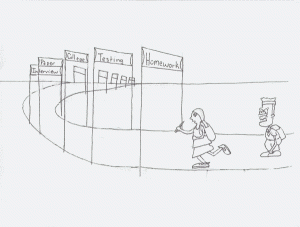 Is stress a problem here at Deerfield? Truth be told, stress is a fact of life. Some degree of stress is expected, living in a world with high expectations and multiple responsibilities. It can be neutral, positive, or negative. In many school environments, the ethic seems to be that if you aren’t stressed and overworked, you’re not working hard enough.
Is stress a problem here at Deerfield? Truth be told, stress is a fact of life. Some degree of stress is expected, living in a world with high expectations and multiple responsibilities. It can be neutral, positive, or negative. In many school environments, the ethic seems to be that if you aren’t stressed and overworked, you’re not working hard enough.
The talk among students and adults is how much work they have, how little time they have to do it, and how low their reserves are (lack of sleep) when it comes to managing it.
Stress is a timely topic, one that has received a heavy dose of attention with the release of the documentary film Race to Nowhere. The New York Times and other national publications recently paid their respects to the issue. Highly stressed secondary school and college students are a popular topic of conversation in the lay and professional press.
Research for stressfocus.com reports that school work and parents top the stress list for 78% of teenagers. In our environment, anxiety about college admissions rises to the top of the list of stressors late in the junior year. Additionally, some students feel stressed about social concerns including friendships, dating, appearance, and family financial circumstances.
While stress can be a positive motivator, too much stress can be physically and emotionally draining. Many Deerfield families choose this school because it is a competitive, action-packed environment with the potential to bring out the best in their sons and daughters.
Parents and teachers talk about wanting students to thrive here, not merely survive. For many, that’s indeed what happens —the stress they experience is functional—and they thrive. For others it can feel like a survival ordeal. Knowing when stress is out of control, and then determining how to back it down, can be difficult to determine. The right amount of push-and-pull for one person may be too much for another.
Students wonder whether their experience of overload is a personal problem or generated by an institutional or community norm.
What else can we do as a community to make thriving everyone’s experience? In 2009, we delayed the start to the academic day. That was a significant move in the right direction, an appreciation of the importance of sleep for growing adolescents. We try to be sensitive to minimizing add-ons. We have rules about length of assignments, clustering of tests, and enforced quiet times in the dorms. Some of those rules are more respected than others. Winter massages and dress-down days are a modest nod toward shifting from a crazy pace. Deans, advisors, and teachers are available for extra help and support all day and into the night.
Proctors and peer counselors work hard to support students experiencing social and emotional distress. The Health Center provides a safe retreat for the overwhelmed. Counselors are available to respond to students feeling pressed and stressed. The introduction of a Residential Life Curriculum may also prove to be a positive step toward addressing the complexities of dorm living. Some of these solutions are intended to be proactive (8:30 start) and some are reactive (recuperation at the Health Center). These efforts and limits are necessary —but not sufficient—as stress-reducers.
Tackling this issue and its attending challenges in a meaningful way is well beyond what I can discuss here. How does the college admission process play in this quandary? Do Deerfield’s pace and demands appropriately prepare students for college and adult life? Are APs a culprit? Are we, parents and teachers, modeling healthy adult lifestyles? Might we choose to build into the daily schedule time for reflection and meditation? What is our collective experience of “community”?
What happened to the “less-is-more” movement? How much of the stress is self-imposed as students push themselves to achieve at the highest levels (being “pretty good” at something doesn’t seem to cut it anymore)?
Isn’t this a cultural phenomenon, a problem shared by, at the very least, all of our peer schools?
We should be willing to look at and talk about how and why we do what we do. Focusing on the topic of stress will advance the conversation.
Stuart Bicknell has been a psychologist since 1990.